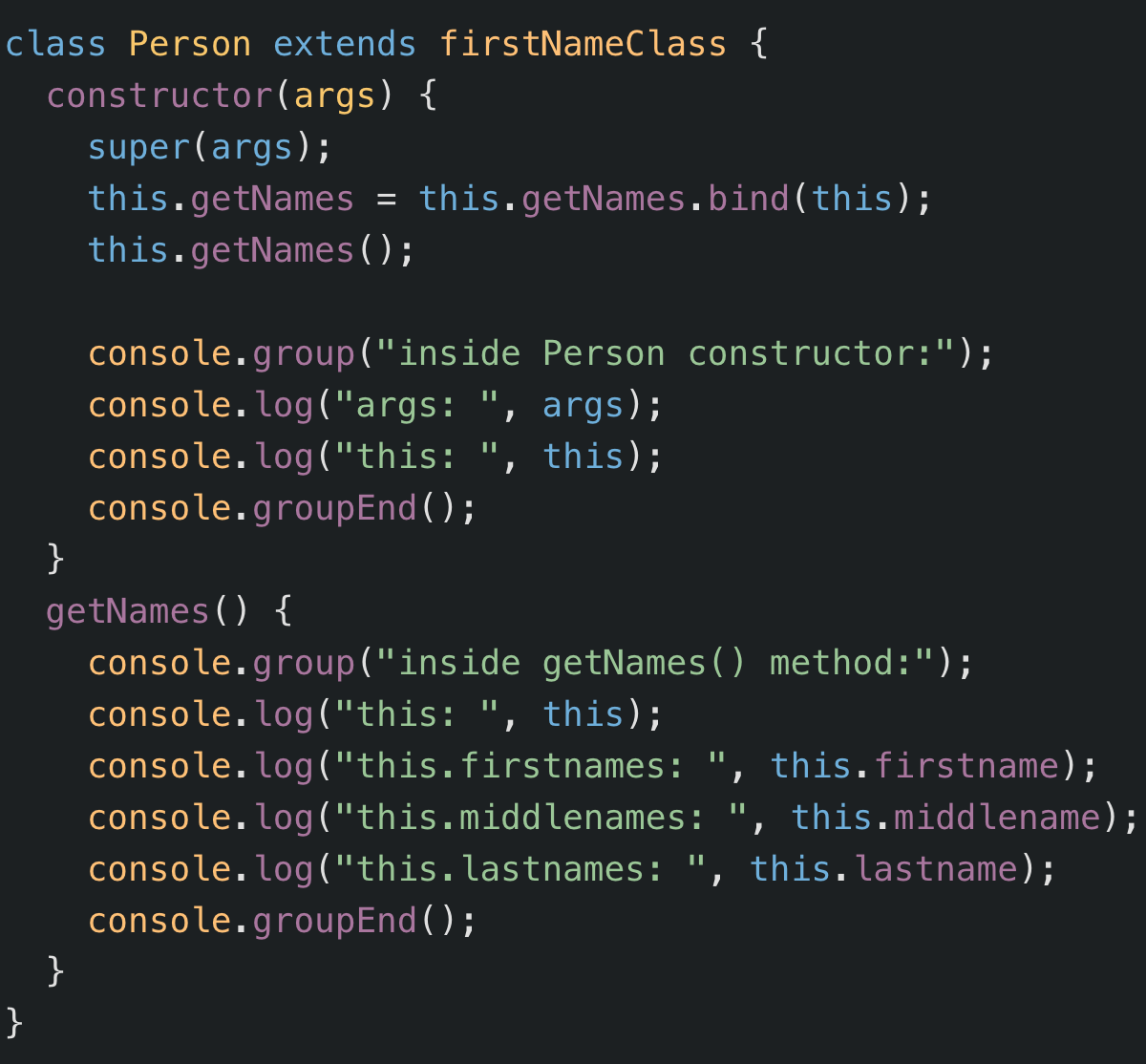This isn't an answer to your question but maybe it's a solution to your problem
JavaScript doesn't have multiple inheritance but luckily for you functional programming has nothing to do JavaScript's class system, object prototypes, or other object-oriented concepts. Functional programming is all about functions!
We begin writing our inheritable modules with some functions
// module 1
const hasFirstName = (firstName = "") => o =>
{
field (o, 'firstName', firstName)
}
// module 2
const hasMiddleName = (middleName = "") => o =>
{
field (o, 'middleName', middleName)
}
// module 3
const hasLastName = (lastName = "") => o =>
{
field (o, 'lastName', lastName)
}
We haven't defined field yet, but don't worry. Let's look at a somewhat more involved module next
// module 4
const nameable = (first, middle, last) => o =>
{
inherit (o, hasFirstName (first))
inherit (o, hasMiddleName (middle))
inherit (o, hasLastName (last))
method (o, 'getFullName', (self) => `${self.firstName} ${self.middleName} ${self.lastName}`)
method (o, 'sayHelloTo', (self, other) => `Hello ${other.getFullName ()}, my name is ${self.getFullName ()}`)
}
OK, so now we can see how some modules can be composed of other modules. Before we look at inherit and method, let's see how we'd use our module
const Person = (first, middle, last) =>
Obj (self => {
inherit (self, nameable (first, middle, last))
})
So maybe you're annoyed that I keep making stuff up in each new code paste, but this is a very powerful practice called wishful thinking
"Wishful Thinking" is a very powerful programming practice:
Before implementing a component you write some of the code that actually uses it. This way you discover what functions with what parameters you really need, which leads to a very good interface. You will also have some good test code for your component.
The idea is based on the fact that an interface's purpose is to simplify the code that uses the component, not to simplify the code that implements it.
Exercising this practice, we wished up this imaginary object system based on what we need it to do - not based on what JavaScript's object system is capable of.
Of course we expect that using our Person will be straightforward
const p1 =
Person ('Augusta', 'Ada', 'King-Noel', 166)
const p2 =
Person ('Gerald', 'Jay', 'Sussman', 71)
console.log (p1.sayHelloTo (p2))
// Hello Gerald Jay Sussman, my name is Augusta Ada King-Noel
And here's the dependencies: What I want you to see here is that no class or even this is used. So even if JavaScript didn't have a native object system, this demonstrates you could make your own
const Obj = (f, instance = {}) =>
(f (instance), instance)
const inherit = (o, f) =>
Object.assign (o, f (o))
const field = (o, name, value) =>
Object.assign (o, { [name]: value })
const method = (o, name, f) =>
Object.assign (o, { [name]: (...xs) => f (o, ...xs) })
Full program demonstration
// DIY class system
const Obj = (f, instance = {}) =>
(f (instance), instance)
const inherit = (o, f) =>
Object.assign (o, f (o))
const field = (o, name, value) =>
Object.assign (o, { [name]: value })
const method = (o, name, f) =>
Object.assign (o, { [name]: (...xs) => f (o, ...xs) })
// module 1
const hasFirstName = (firstName = "") => o =>
{
field (o, 'firstName', firstName)
}
// module 2
const hasMiddleName = (middleName = "") => o =>
{
field (o, 'middleName', middleName)
}
// module 3
const hasLastName = (lastName = "") => o =>
{
field (o, 'lastName', lastName)
}
// module 4
const nameable = (first, middle, last) => o =>
{
inherit (o, hasFirstName (first))
inherit (o, hasMiddleName (middle))
inherit (o, hasLastName (last))
method (o, 'getFullName', (self) => `${self.firstName} ${self.middleName} ${self.lastName}`)
method (o, 'sayHelloTo', (self, other) => `Hello ${other.getFullName ()}, my name is ${self.getFullName ()}`)
}
// Person class
const Person = (first, middle, last) =>
Obj (self => {
inherit (self, nameable (first, middle, last))
})
// demo
const p1 =
Person ('Augusta', 'Ada', 'King-Noel')
const p2 =
Person ('Gerald', 'Jay', 'Sussman')
console.log (p1.sayHelloTo (p2))
// Hello Gerald Jay Sussman, my name is Augusta Ada King-Noel
Our Person class can obviously define its own fields and methods as well
const dateDiff = (d1, d2) =>
Math.abs (d1 - d2) / 1000 / 60 / 60 / 24 / 365 >> 0
const Person = (first, middle, last, birthdate = new Date) =>
Obj (self => {
inherit (self, nameable (first, middle, last))
field (self, 'birthdate', birthdate)
method (self, 'calculateAge', (self) => dateDiff (new Date, self.birthdate))
method (self, 'sayAge', (self) => `I am ${self.calculateAge()} years old`)
})
const p2 =
Person ('Gerald', 'Jay', 'Sussman', new Date ('February 8, 1947'))
console.log (p2.sayAge ())
// I am 71 years old
Get creative and invent any other features you want
- Maybe you want to make an
overrideMethod that gives you the ability to define a new method with the same name, but still give the caller access to both methods
- Maybe you want
privateMethod or classMethod helpers
- Maybe
field could be enhanced to emit events when values changed
- Maybe
field could be changed so that values cannot be set, where mutableField could be used for fields that can change
Write it how you want it then make your wishes come true. Any limitations are you own.



composedefined? – Civvieshttps://github.com/stoeffel/compose-function/blob/master/module/index.jsbut the same thing happens with Lodash'sflowRight– Courteous